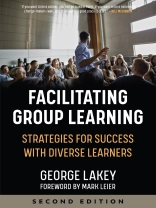From the acclaimed coauthor of A Manual for Direct Action comes Facilitating Group Learning, an essential resource designed to help educators, trainers, workshop leaders, and anyone who assists groups to learn. George Lakey presents the core principles and proven techniques of direct education, an approach he developed for effectively teaching adults in groups. To illustrate how it works in action, Lakey includes a wealth of compelling stories from his vast experience facilitating groups in a variety of situations.
Direct education cuts through the pretense and needless complications that can distance learners from subject matter. It removes false expectations (for example, that kinesthetic learners will strongly benefit from slide presentations) and false assumptions (for example, that a group is simply the sum of the individuals). This approach focuses the encounter between teacher and group; it replaces scattered attention—of a teacher preoccupied with curriculum and participants preoccupied with distractions—with gathered attention.
Unlike in other books on group facilitation, the author emphasizes critical issues related to diversity, as well as authenticity and emotions. Step by step, this groundbreaking book describes how to design effective learning experiences and shows what it takes to facilitate them. Ultimately, it brings all the elements of the author’s direct education approach together.
Facilitating Group Learning also contains material on sustaining the educator, addresses working with social movements, and includes the Training for Change toolkit of group learning techniques.
Circa l’autore
George Lakey has led over 1, 500 social change workshops on five continents. He recently retired from Swarthmore College, where he was the Eugene M. Lang Visiting Professor for Issues in Social Change. He has also taught sociology at Haverford College and the University of Pennsylvania. He was a trainer for the 1964 Mississippi Freedom Summer, revised the worker education program for the Canadian Union of Postal Workers, and led education programs for LGBTQ people, Mohawks, clergy including Buddhist monks, anarchists, psychologists, prisoners, social workers, African National Congress peacekeepers, and many kinds of community advocacy groups. He cofounded the organization Training for Change and directed it for fifteen years. In 2010 he was named Peace Educator of the Year by the Peace and Justice Studies Association. His ten books have all been about change, including How We Win (2018). He lives in Philadelphia.












